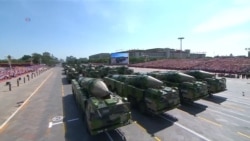Chinese President Xi Jinping has announced plans to cut his country’s military force by 300,000 troops. The announcement came on Thursday during a huge military parade marking the 70th anniversary of the end of World War II. Mr. Xi welcomed about 30 world leaders to the event in Beijing. But Russia was the only other ally from the war to send its leader.
Some observers say the size of the parade raised concerns about China’s military goals. It stretched through Tiananmen Square and the center of Beijing. It was the biggest evidence yet of China’s military strength.
New weapons, tanks and aircraft were shown to the public for the first time. The weapons included the Dongfend-21D anti-ship ballistic missile. State media call the missile the “carrier killer” because of its reported ability to attack aircraft carrier strike groups.
Yet Chinese officials said the aim of the parade was more about remembering history and working for peace. President Xi spoke at the event.
He said, “Prejudice and discrimination, hatred and war can only cause disaster and pain. Mutual respect and building relationships with each other on equal terms, peaceful development and joint prosperity are the only ways this can be done in the world.”
The Chinese leader promised to reduce the number of soldiers in the army to two million. Observers consider the reduction a part of the military’s efforts to modernize.
The parade was both a reminder of China’s past suffering and a celebration of its recent progress. Yet the military nature of the event raised questions about China’s rise and the role it seeks to play in the world.
Military power on parade
Kerry Brown directs the China Studies Center at the University of Sydney. He says the parade sent somewhat conflicting messages. He says it showed the Chinese people that the government is strong and is defending the country’s interests. In addition, he says, China was telling the rest of the world not to worry about China as a threat.
“What he’s (Xi) saying is to his own people and to the rest of the world, China is now strong enough not to be pushed around. But he’s not saying China is now ready to start pushing the rest of the world around.”
China has not fought in any military conflict since 1979. For that reason, it has no battlefield experience using the equipment seen at the parade.
Michael Raska is with the Institute of Defense and Strategic Studies in Singapore. He thinks the reduction in forces is a sign that China’s president is launching military reforms.
“He (Mr. Xi) wants a smaller and smarter military,” Mr. Raska says. “Weapons are (just) so much shining steel unless they can be used effectively. China needs to improve the (computer) software side of things.”
Arms race
Chinese leaders have been attempting to re-direct the military from its traditional role of defending the mainland to strengthening China’s naval forces.
Some observers, however, felt the parade could provide fuel to what they consider an arms race. They note that China has sought to resolve what it says are its territorial claims in the South China Sea and East China Sea.
Dipankar Banerjee works with the Institute of Peace and Conflict Studies in New Delhi. He believes that “China’s number one aim is to threaten Japan.” On Thursday, Japan’s chief cabinet secretary reacted to the military parade by calling for all sides to look forward.
Territorial disputes
China’s tensions are not only with Japan. Recent Chinese actions have increased tensions with other countries. China and Russia held joint military exercises last month in the Sea of Japan. This week, United States officials reported that five Chinese Navy ships were seen in international waters in the Bering Sea, near the coast of Alaska.
The Pew Research Center asked people across Asia what they thought of China. It found that 57 percent of those questioned have a good or favorable opinion of China. But those in neighboring countries had sharply different ideas.
Nine percent of Japanese, for example, had a favorable opinion. In Vietnam, the rate was 19 percent. Respondents from six of the nine countries near China expressed concerns about territorial disputes.
I’m Christopher Jones-Cruise.
VOA Correspondent Bill Ide reported this story. George Grow adapted it for VOA Learning English. Mario Ritter was the editor.
_______________________________________________________________
Words in The News
aircraft – n. airplanes and/or helicopters
prejudice – n. opinions or ideas that are not based on fact or reason
mutual – adj. held in common by two or more sides
prosperity – n. the state of being successful, usually by earning a lot of money
reminder – n. the cause of making someone remember something
role – n. the part played by an actor; the part that someone has in a group
software – n. programs operating on a computer
favorable – adj. showing or expressing approval





